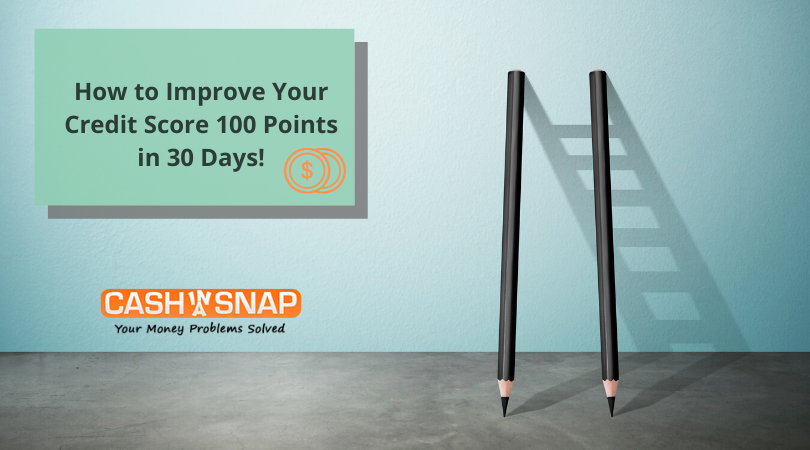There are ways you can improve your credit score as much as 100 points in just 30 days. Not everyone can see such a large score increase, but it is possible. Here’s how to get started:

Get a free credit report
Before you can start to improve your credit score, you have to know where you stand. The quickest way to do this is to get your credit report from one of the many free services like Credit Karma. You can get 2 of the 3 credit bureau scores from this service. You can also get a free report on the government site called www.annualcreditreport.com (but only once a year).
Identify any negative accounts
Now, you have to find out if you have any negative hits to your score i.e., any reports that are negative. These may include a collection account, late pays, bankruptcies, and so on.
Pay off your credit cards
This is probably the hardest thing to do for many people, but it is the most critical starting point for raising your scores. Your credit card utilization ratio is a large factor in your credit score. Your utilization ratio is just the amount of credit card debt you have now compared to your total credit limit.
To maximize your score, you must keep your ratio below 15%. For example, if your total credit card limits (added up together) are $10,000, you don’t want to have more than $1,500 on the cards at any time. This credit utilization ratio is a large part of your FICO score, 30% to be exact.
Your payment history also has a 30% impact on your overall credit score. Set up your budget and pay your credit card balances down to zero or as low as you can to reach the 15% ratio.
Contact the collection agencies
If you find you have bills that have gone to collections on your report (you probably have been contacted by an agency if you do), then contact the agency to see if they will delete the collection report if you pay the bill. This is called: pay for delete. Just like it sounds, you pay the amount you owe, and they remove the negative account from your credit report.
Make sure you keep a record of the person who agreed to do this and their phone number. More importantly, ask for a ‘pay for delete’ letter from the collection agency that specifically says they agree to remove the account from your report completely if you pay the amount in full. Note: agencies will not do this if you pay less than the full amount.
Don’t pay if a collection agency will not remove the account from your credit report
When it comes to your credit score, any collection account that is on your report affects your credit score even if you paid it, and it shows ZERO owed. Never pay collection accounts without a ‘pay for delete’ letter from the agency.
Removing a collections account from your report is the only way it will improve credit score. If the collection agency tells you that they will report your payment but cannot remove it, don’t pay it! They may tell you it will help, but it will not. Any collection account, paid or unpaid, on your report, lowers your score.
Dispute any negative account on your credit report
Most people never dispute a negative account showing on their credit report. However, when you send in a dispute letter about any account that you feel is inaccurate, even if it is just technical difference (like the balance due is really $135.67, but it shows $137.65), the credit bureau has only 30 days to review and respond to your dispute. If they cannot prove your claim is invalid, they must remove the item from your report.
There are people who have had 10 or more negative listings removed just by challenging them. Keep in mind you must send independent letters to each bureau for each item. If your dispute is rejected, it will not affect your score.
You can dispute credit inquiries too
Hard credit inquiries will lower your scores for a short time. If you are getting a new car or making a major purchase that requires credit, there will be a hard inquiry. You can dispute and get the hard inquiries removed from your report. You cannot have hard inquiries removed if you authorized them. So, only dispute ones you feel you did not approve. You can call the credit bureaus directly to dispute these items.
Get yourself added as an authorized user on a credit card
Now this one is tricky. Most of the time, only a close family member or long-time friend would consider allowing you to be an authorized user on one of their credit cards.
You will need to tell them you do not want to use the card but just be an authorized user. It will improve your credit score as long as you are sure the card is in good standing. You will have to ask if there is a low balance and no late payments before being added as a user.
How is your FICO credit score calculated?
Your FICO credit score is calculated using algorithms created by FICO. You will often see differences in your scores from one bureau to the next. This can be due to what they receive to report as well as slight differences in their specific weightings.
Here is the simplest breakdown of what impacts or makes up your scores:
Payment History is about 35% of your score – This includes on-time payments, late payments, collection accounts, etc. Late payments can negatively affect your score for 3 years.
Credit Utilization Ratio is about 30% of your score – This is the total amount of debt you have, including auto loans, home mortgages, credit cards, and all other loans.
Length of Credit History is about 15% – This includes the average age of all open accounts as of the current date. This is why you do not CLOSE accounts even if paid off. They actually help your score because they are unused credit.
New Accounts are about 10% – Just like it sounds, these are newly opened accounts. New credit inquiries or hard checks impact your score for up to 2 years.
Credit Mix is about 10% – Your credit score is best when it is a mix of credit types like a home mortgage, credit cards, auto loans, personal loans, or purchases and so on.
What is considered good or bad credit?
There is no one standard for what is good or bad. It varies quite a bit, so this is just a general guideline.
| 720+ | Excellent credit |
| 680-719 | Good credit |
| 620-679 | Fair credit |
| 580-619 | Poor credit |
| 579 and lower | Bad credit |
Do you need some quick cash loan to cover some emergency expenses?
Try a quick cash loan with CashinaSnap!


